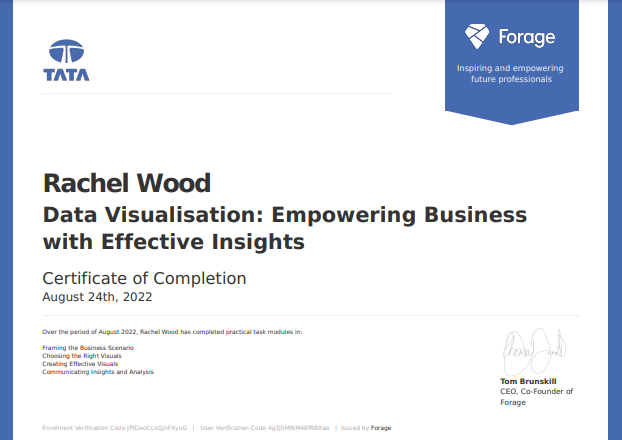Research shows that almost half of college students do not have a clear understanding of what different employers do. Forage aims to change that. Of course, before I recommend any platform or product to students (even if it is free) I explore it myself. I want to know if it’s legit, if it is helpful, and if I’d want to stake my own reputation on its recommendation.
This fall I chose two different job simulations with Forage: one focusing on data visualization and one focusing on marketing.

Data Visualisation Job Simulation
For my first project, a company called Tata pointed me to tutorials for data visualization tools, and gave me data to analyze. I created real data visualizations to answer questions from the CEO and CMO. I also recorded a video describing what I did and how I did it. Between reading the materials provided, watching some tutorials (where I learned skills I’ll actually use in the future), and completing hands-on activities, the whole project took me about six hours.
Omnichannel Marketing Job Simulation
For my second job simulation, I chose a marketing role with lululemon. After extensive research, I ended up writing a creative brief for a marketing campaign for their new Mirror product. That project took me about three hours, but it could have taken me less had I not gotten “into it” as much as I did.
Insights
Full disclosure? I started a few other simulations as well, but I didn’t complete them. This is okay! Those companies (and you, dear reader) won’t know that I quit after I began. My name is oblivious to them. However, I did get to jump into something I initially thought might be interesting. Once I realized it wasn’t for me, I quit and moved to something else.
After submitting my own work for both completed projects, I got to see “model” answers. These allowed me to compare my efforts to what the company considered excellent work. I did some self-evaluation and noted where I might improve in the future.
Here’s the key point: I was able to submit these work practices to Forage without showing them to the employers involved. Neither lululemon or Tata will see my work, because I chose not to share it.
Why is that important? You might follow that same path if you are simply “trying out” a job. You might quit half-way through when you say “Ya… this job isn’t for me.” Doing a job simulation lets you get a glimpse into what someone actually does while they’re at work; instead of just reading about it, you’re doing it.
Conversely, anyone who wants to may share their work. Maybe you want to apply for an internship or job at the very company for whom you do a job simulation? In that case, you can submit your work for an advantage in the application process. Recruitment is, afterall, why the companies agree to participate and provide job simulations in the first place! According to Forage’s own Outcomes study, employers are twice as likely to advance a “Forager” to the interview stage with their organization, and four times more likely to extend an offer.
I’m not applying to Tata or Lululemon. However, I now have a digital badge/certificate that I could add to my resume, LinkedIn profile, etc. I could showcase these work experiences without having to have had an internship or job with either company. I think that’s pretty great.
Pros and Cons
- Pros of Forage:
- Helped me learn about the jobs of a data visualization specialist and a omni-channel marketing specialist
- Helped me create potential work for my portfolio
- Helped me make a connection to the two companies for further internships/career
- Cons of Forage:
- Projects take time
- Projects are simulations, and therefore are unpaid
Interested in learning more? Check out Forage for yourself.
